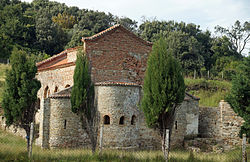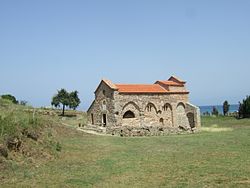| St. Anthony Church, Durrës | |
|---|---|
| Native name Kisha e Shën Ndojt (Albanian) | |
 East side of the building with apsis East side of the building with apsis | |
| Location | Ishëm, Durrës, Albania |
| Coordinates | 41°34′59″N 19°27′30″E / 41.5830°N 19.4583°E / 41.5830; 19.4583 |
| Cultural Monument of Albania | |
The ruins of St. Anthony Church (Albanian: Kisha e Shën Ndojt) is located at Rodon Cape (alternatively known as Skanderbeg Cape) in Durrës County, is a Cultural Monument of Albania. It became a Cultural Monument in 1963. It is also the location where Andrea II Muzaka and his wife Euphemia Mataranga got married most likely around 1328, then buried later on.
History

Saint Anthony Church was of the most popular churches of the area of the Albanian Medieval Period. This is also due to the construction of Skanderbeg's Castle in that Cape area in the 15th century, Indirectly it is called the Skanderbeg church.
Based on documents dated from 1418, the church is thought to have been principally connected to a Byzantine monastery dedicated to Saint Mary that was situated near the current church. The architectural style was Romano-Gothic. Later sources of 1599 show that at that period the monastery was dedicated to Saint Anthony of Padua and belonged to the Franciscans.
Up until 1852, when an earthquake demolished them, the church and monastery were still in operation. After their destruction, they left in ruins until 1978. By 2000, the church and parts of the monastery had been rebuilt into what it is now.
Inside the church there are some wall paintings, which include a two headed eagle and a horse with a female rider, who is believed to be Mamica Kastrioti.
Gallery
-
 Back view.
Back view.
-
 Side view.
Side view.
-
 Inside view.Graves of Andrea Muzaka and his wife can be seen on the floor of the church.
Inside view.Graves of Andrea Muzaka and his wife can be seen on the floor of the church.
-

-
 The Albanian double headed eagle painted in the walls during the medieval times.
The Albanian double headed eagle painted in the walls during the medieval times.
-

-

-

-
-
References
- "Religious buildings with the "Culture Monument" status". Republic of Albania National Committee for Cult. Archived from the original on July 6, 2011. Retrieved October 28, 2010.
- Szende, Katalin (2000). Annual of Medieval Studies At Ceu. Volume 6. Central European University, Department of Medieval Studies. p. 134.
...This wedding took place probably sometime around 1328, judging from the reference about the age of their children in AA: 808 (30 December 1336)...
- Szende, Katalin (2000). Annual of Medieval Studies At Ceu. Volume 6. Central European University, Department of Medieval Studies. p. 134.
...(that of Andreas II Musachi and Euthimia Matarango from the fourteenth century) was emphasized because of its ceremony in the cathedral church of St. Anthonius in Durazzo...
- Elsie, Robert (2003). Early Albania A Reader of Historical Texts, 11th-17th Centuries. Harrassowitz. p. 42. ISBN 978-3-4470-4783-8.
...Lord Andrew Musachi, the said second despot, and his wife, Euthymia, as she was called, were buried in the town of Durrës, within the church of Saint Anthony, to the right side of the main altar, in a beautiful grave made of marble and containing the following epitaph: 'Here lies Lord Andrew Molosachi, Despot of Epirus'...
- ^ EU4Culture - St. Anthony Church, Cape of Rodon
- "Misteri i Kishës në Kepin e Rodonit". Gazeta Si (in Albanian). 2019-01-03. Retrieved 2023-03-01.
| Religious Cultural Monuments in Durrës County | |
|---|---|
| Durrës | |
| Other towns |
|

